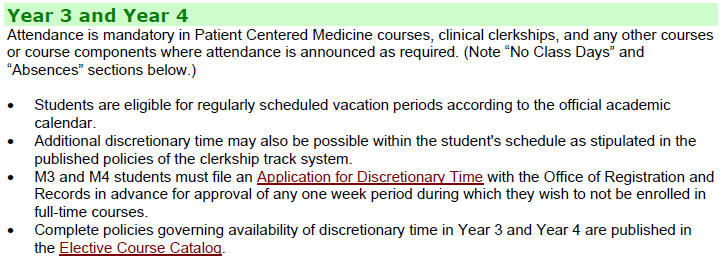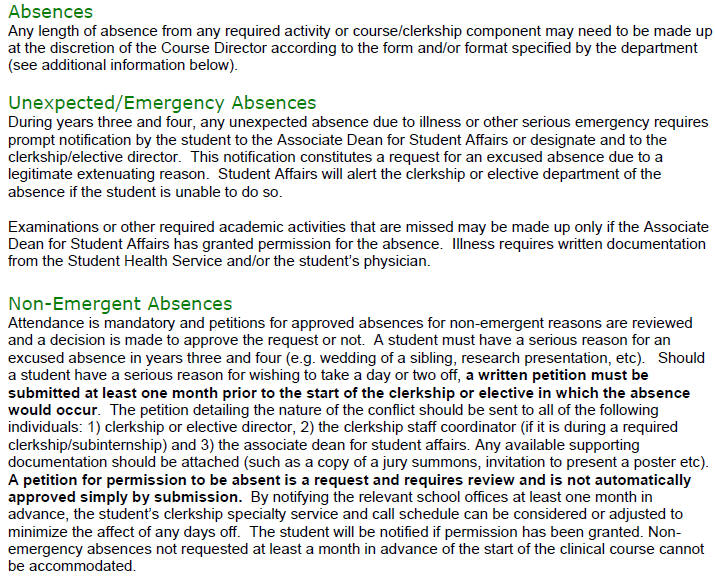
General Responsibility as Clerkship Medical Students
Attendance Policy
Time Off Policy
On Call Policy
Behavioral Expectations
Professionalism
Optional Learning Opportunities
General Responsibility as Clerkship Medical Students
Medical students assume a dual role in their clerkship. One is that of a
student. As a medical student you are acquiring the skills, experience,
and expertise to assume the level of clinical responsibility of a resident
and, later, an attending. In the capacity of a student you are offered
various educational opportunities (lectures, PCM-3, SPPAM, etc) that are
allowed to take precedence to your usual clinical responsibilities. It is
up to you to take advantage of these opportunities as you assume
responsibility for your medical education.
The second role in the clerkship is as a member of the treatment team in the
care of patients. In this capacity, you are a professional. As a
professional you have an obligation to contribute toward the optimal
functioning of the treatment team in the care of the patients. This
requires continual communication with your service (typically your resident)
so that your availability for clinical assignments is maximized. It also
may require flexibility in your personal schedule according to what is
happening on your service at the time.


On Call Policy
- Switching call is strongly discouraged. If a switch in necessary, find a student willing to switch. Both students involved are required to email the clerkship coordinator
aandel@lumc.edu at least ONE WEEK in advance of the call. You must switch a Friday for a Friday, Saturday for a Saturday, or Sunday for a Sunday. Mondays through Thursdays are exchangeable (except if it interferes with SPPAM/Morning Report). Remember, it is your responsibility to make sure that you have yourself covered and that you have done so in a timely manner.
- On call student attire need not be as formal as during the day, but should not be overly casual. Please use your common sense. Scrubs are not to be worn.
- A call report is to be turned in each time you are on call.
These reports are helpful in determining the types and numbers of
patients seen and the amount and quality of teaching done by the
residents.
Turn in your call reports promptly to the Clerkship Coordinator.
- You are to remain in the hospital for the duration of your assigned call. It is not acceptable to split the call with another student. It is not acceptable to go home because “it was slow” or to be unavailable during any portion of call.
-
After call if a student is too tired to
safely drive home, he or she should not drive. Instead they should
get a cab from American Taxi (847-671-1133).
The receipt can be brought to Amy Andel for reimbursement. If there is
need to take a cab back the next day because their car was left at
school, the student should also bring that receipt for reimbursement.
These reimbursements will be monitored to assure appropriate use of the
system. The student's safety is paramount and students are encouraged
to be safe and responsible, not to tough it out.
- .Any
irregularities in student reporting for on call duty or on call
availability may, at the discretion of the Clerkship Director, result in
making up the on call assignment and may have an effect on the student’s
clinical floor grade. Failure to complete the on call requirements will
result in remediation of the call by the student. Failure to remediate
the call will result in an incomplete clerkship and will be reported to
the Dean’s Office.
Professionalism
- Patient Logs
You are advised to keep up your pocket cards daily and enter them in the
computer weekly. On Friday of week three, it is required that your
patient log be up to date. It will be evaluated that day to monitor
your exposure to a diverse range of psychopathology. You must review
your patient log (yellow card) with your supervising attending. Two
weeks after the exam your log will be locked, and you will no longer be
able to enter data. If you have not completed your log before that
time, your clerkship competency “professionalism” will be marked as
“meets with concerns.”
- Keys
The VA and Madden developed a policy that you will not pass the rotation until your keys are returned to the administrative office.
Optional
Learning Opportunities
-
Department of Psychiatry and Behavioral Neurosciences Grand Rounds
All students are encouraged to attend the Loyola Psychiatric Grand Rounds (PGR)
Thursdays at noon, in Case Method Room 360 in the Medical School Building
120.
Behavioral Expectations
- Loyola University Chicago is committed to maintaining and environment that respects the dignity of all individuals. Accordingly, the Stritch School of Medicine does not tolerate mistreatment by or of its students, faculty, and staff. Our mission requires respect among all individuals, the creation and maintenance of a positive learning environment, and a consciousness to model standards of behavior that are consistent with the Catholic and Jesuit heritage of our institution.
- To maintain a positive learning environment, the following behaviors by medical students are considered unprofessional and unacceptable:
- physical and verbal intimidation;
- lying, cheating, and fabricating information;
- sexual harassment and patterns of sexual innuendo; and
- discriminatory actions based on race, gender, ethnicity, sexual orientation, or religion.
- Among the faculty and house staff there is no tolerance for:
- physical or verbal intimidation;
- sexual harassment and innuendo;
- abusive comments related to personal characteristics of another (race, gender, ethnicity, sexual orientation, religion);
- insulting or belittling remarks in any situation, especially when dealing with individuals who are trying to learn and may not know the answer; and
- allowing medical students and house staff under your supervision to verbally or physically intimidate, abuse, sexually harass, insult, or belittle another person.
Medical students may be reluctant to discuss mistreatment for fear of reprisal; yet they often desire that alleged mistreatment incidents undergo proper investigation. To address student concerns, Stritch provides informal channels through which students may discuss their concerns and receive counseling. During the psychiatry clerkship students need to bring their concerns directly to the clerkship director. Confidentiality will be respected as much as possible and serious efforts will be made to insure the student's grade is not negatively impacted by an incident. There are also formal reporting mechanisms through which complaints are investigated and appropriate remedies applied
Previous
 |


